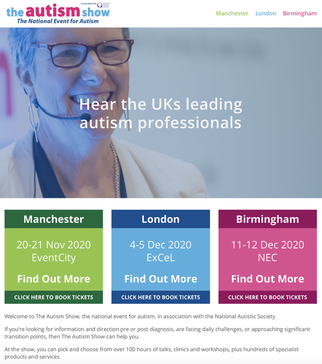|
by Douglas Silas, specialist SEN solicitor Here is my update for this week. It’s been a bit of a slow week for SEN news I am afraid. So, as I know that people sometimes rely on my SEN updates to keep abreast of forthcoming SEN events and, as nearly all of them in the past few months and those in the next few months have had to be rearranged, I thought it may be helpful for me to give you some information about these this week. I hope that this helps people again 1. What has happened this week? As you may recall, the Naidex exhibition which focuses on disability and which was due to be held at Birmingham NEC in March, is now due to be taking place on 9-10 November 2020. Their website states: “Naidex is Europe’s largest and most inclusive event for the independent living community. Naidex is for all! We welcome everyone who is living with health conditions or impairments, as well as anyone caring for or supplying to this community.” READ MORE The next thing that I want to draw you attention to it The Autism Show, which was due to take place at Excel in London, the NEC in Birmingham and at EventCity in Manchester, in June 2020. It is now due to be taking place at the same venues, but in a slightly different order this time on 20-21 November at EventCity in Manchester on 4-5 December at Excel in London and at the NEC in Birmingham on 11-12 December 2020. Their website states: “If you’re looking for information and direction pre or post diagnosis, are facing daily challenges, or approaching significant transition points, then The Autism Show can help you.” READ MORE The third thing that I want to highlight this week is the TES SEN show, whose London show usually takes place in October every year and who were, for the first time, going to also hold a North show in April in Manchester. However, they have only rescheduled (as far as I can see) to again only hold a London show at the Business Design Centre on 8-9 January 2021 Their website states: “Visit the UK's leading special educational needs (SEN) show on 8 - 9 January 2021 and discover the tools, resources and support to empower young learners with SEN.” READ MORE 2. What does all of this mean? I know that a lot of people are nervous still about going to exhibitions again and I am sure that the organisers of all these events have put in place as many facilities and precautions as possible, to make everything as safes as can be. In fact, the Naidex website actually states: “We have been working closely with all event industry stakeholders developing an industry-wide ‘All Secure Standard’ alongside the UK government that will allow organised industry gatherings take place again. Through the four key cornerstones we will ensure our visitors, exhibitors, and colleagues, are protected whilst making events high-quality and productive experiences.” However, please do not feel under any pressure to go to these events if you do not feel able or ready to. Your health and the health of your loved ones around you always comes first… 3. Where can I find further information?
Aside from clicking on the relevant links for more information, I would again remind you of the very useful resources and information provided on the following websites: - IPSEA - Council for Disabled Children - Contact - Scope - Special Needs Jungle I would also highlight again the fact that you can now get digital copies of the magazines: SEN Magazine and Autism Eye which are both very helpful to any parents or professionals involved with children/young people with SEN. Keep safe until next week. With best wishes Douglas P.S I understand that there are a number of educational or other useful resources now on the web - I would be very grateful if you could let me know of any that people are finding useful, so that I can direct others to them. P.P.S. I also want to highlight again the fact that there are currently a lot of scams out there, both online and through texts/WhatsApps. Please be extremely careful and help yourself and others not to become victims. You can learn more at: www.FriendsAgainstScams.org.uk. by Douglas Silas, specialist SEN solicitor Here is my update for this week.
Judging by what I am reading and hearing over the past week, it seems to have been getting a lot tougher out there for parents of and children/young people with SEN. I therefore want to highlight this week some of the issues and also some people/organisations who are providing useful information. I was also emailed by some parents/people after my update last week, one of whom said: ‘Thank you for your updates, they are proving very useful. It's good to have things in one place and not have to trawl through the vast amounts of information out there, particularly given I rarely know what I should be looking for, let alone where!’ I have therefore provided links again in this update. I hope that this helps people again. 1. What has happened this week? It is firstly useful to remind everyone again about the current situation for ‘vulnerable children’ – a useful summary of which was provided by the National Children’s Bureau (NCB) on its website, entitled: ‘Coronavirus spotlight: vulnerable children’, which states: ‘For some children, circumstances at home or in their community mean they face greater risks than others. Some, but not all, of these children will be supported by a social worker. The coronavirus crisis is likely to elevate the risks to these children, and services may be less able to respond to their needs. School closures and vulnerable children The closure of schools for most children, while necessary to halt rates of infection, is one reason why some children will be at greater risk. Schools act as crucial sources of safety and support, and act as warning systems for all children, especially those at risk. At a basic level, schools often provide some children with their only hot meals of the day, but they also provide counselling, or just a place where they can feel safe and settled. Schools also act to alert other professionals when things go wrong. The emergency measures put in place by the Government mean many children are not in school, and they no longer benefit from this scaffolding. But even for those children who are able to remain in school, it is not clear that the structures that help them will remain – with significant staffing shortages, and classes of different ages and levels grouped together, the environment will be significantly different.’ --- You can also find useful information about what is happening generally on IPSEA’s webpage entitled: ‘IPSEA update on COVID-19, school closures and SEN provision’, which is well worth a read. --- In terms of things getting tougher, there was an article written by a parent in The Guardian entitled: ‘'We're on our own': how the pandemic isolates families of disabled children’, which said: ‘Families of children with special educational needs and disabilities are a resilient and resourceful group of people. Many of the qualities required to endure the coronavirus pandemic – vigilance, self-containment and mutual aid – are basic skill sets to parent carers. Whether at school, work or in community life, we are past masters at social distancing and social isolation. Our families have poorer physical and mental health than most. We earn less, have higher household costs, are more isolated, and break up and break down more. Somehow, perhaps because we have no choice, we manage to endure. Ours is also a vulnerable group – not just to the virus itself, but to the social and economic consequences of the pandemic. Little has been said by government or the national media about the very complex needs of our families during this crisis; no answers yet for a parent-carer like Debbie Taylor, an NHS psychotherapist and key worker who cannot send her daughter, Sarah, to school as she has tuberous sclerosis and is prone to chest infections. The pressure on the NHS also means Sarah’s annual MRI scan, to check that tumours on her major organs have not grown, has been cancelled. Meanwhile, Debbie works and juggles caring for Sarah over an 18-hour day. “I am exhausted, there is no let up,” she says. “Normal coping strategies or self-care mechanisms are all gone. All our support systems were already unravelling. There is no plan B. We are now on our own.”’ --- There was also a piece on Autism Eye’s website entitled: ‘We Can’t Get Food We Need, Say Parents’, which said: ‘Families of autistic children are struggling to get food from supermarkets amid the coronavirus pandemic. Parents say their children live on restricted diets and shops are being stripped bare of the foods they eat. Some supermarkets, including Tesco and Sainsbury’s, have set aside periods when the elderly and vulnerable can shop. Impossible to register But Beth Morrison, who runs Positive and Active Behaviour Support Scotland(PABSS), says she has found it impossible to register as “vulnerable” with Sainsbury’s. Morrison is self-isolating with husband Peter, 57. Peter had a heart attack three weeks ago and has had a pacemaker and defibrillator fitted. The couple’s son, Calum, and daughter, Paige, are also self-isolating. Calum, 21, has epilepsy, cerebral palsy, autism and a learning disability. Not been able to book a delivery Morrison, 54, from Monifieth, in Angus, gets much of Calum’s diet from Morrison’s. However, she has not been able to book a delivery online. She said Calum eats only chicken or sausages from Sainsbury’s or Marks & Spencer. “He is so sensitive with food — sensory issues with food. He can actually tell the difference just by smelling the chicken,” she said. Morrison has relied on Calum’s support workers to go shopping. Son will only eat certain brands Anna Champion, 39, from Chippenham, said her son Ben, 12, who has autism and a learning disability, will also only eat certain brands. She wrote on Autism Eye’s Facebook page: “I don’t know what to do. He is eating virtually nothing as I can’t get what he likes.” A spokesperson for Tesco confirmed that families of children and adults with autism can use the store during slots set aside for vulnerable groups. Families will not be asked for proof, added the spokesperson.’ --- One of the most notable things this week was the relaxing of the rules on lockdown exercise for some children/young people with SEN, which was summarised on Contact’s website in an article entitled: ‘Government clarifies exercise guidance for people with health needs’, which said: ‘The government has clarified social distancing guidance for people whose disability or health need requires them to exercise more than once a day. Ordinarily, people are advised that they may leave the house for exercise only once a day, for example to take a run or go for a cycle. This should be within the local area only, to minimise the risk of spreading the virus. However, if your child has a health need or disability that means they need to exercise more than once a day, it is fine to do so. Similarly, if your child has to take a specific form of exercise beyond the local area, it's ok for you to take them there. This might be, for example, if your child has autism or learning disabilities. The government advises that such exercise would ideally be in line with a care plan. And of course, it is still important to follow other social distancing rules such as keeping 2m away from other people.’ --- There was also an interesting article by barristers, Steve Broach and Alice Irving, (which you can find on the Special Needs Jungle’s website) entitled: ‘Why the Coronavirus lockdown adjustment for people with disabilities and mental health conditions was the right thing to do’, which said: ‘Changes to lockdown policy for disabled people and those with mental health conditions A recent example involves two families with autistic children (the claimants), working with lawyers (Bindmans LLP and Steve Broach at 39 Essex Chambers, one of the authors of this article), to secure a change to the government policy that people should only leave their homes once a day for exercise. The policy was amended to allow people with a specific health condition to exercise more often, or to travel away from their home to exercise, if it is necessary for them to do so. This is an important change in the policy. Adherence to lockdown and social distancing rules is essential to ensuring we, as a country and community, come through this crisis. However, while it is hard for all of us to abide by these rules, they do not impact on all people equally. Seeking recognition of this is not a case of disabled people using an excuse to avoid adherence to lockdown requirements. It is a recognition that, for some people, not being able to go outside more than once a day is not merely unpleasant but has a potentially significant impact on their health and wellbeing. This is clearly illustrated in this statement from a parent of one of the claimants: “Over the last couple of years, our autistic son has made huge strides self-managing his sensory, communication and health difficulties and asking for what he needs in order to be able to cope with them. These include long walks in the countryside, which he finds very relaxing and pleasurable from a sensory point of view, and being taken for drives in the car while listening to music with his dad. "So when the lockdown was announced, we were worried that being limited to one outing a day in the local area would make it impossible for our son to deal with the situation and that this could lead to severe meltdowns. Having the guidelines clarified by the government has lifted a huge weight from our shoulders, and as a result, our son has been managing well with the limitations of the lockdown while maintaining social distancing.” While the main guidance still states that you should only leave the house for “one form of exercise a day” a new section was added entitled “Can I exercise more than once a day if I need to due to a significant health condition?” It is worth setting out this new section in full: “You can leave your home for medical need. If you (or a person in your care) have a specific health condition that requires you to leave the home to maintain your health – including if that involves travel beyond your local area – then you can do so. This could, for example, include where individuals with learning disability or autism require specific exercise in an open space two or three times each day – ideally in line with a care plan agreed with a medical professional. "Even in such cases, in order to reduce the spread of infection and protect those exercising, travel outside of the home should be limited, as close to your local area as possible, and you should remain at least two metres apart from anyone who is not a member of your household or a carer at all times.” Conclusion The way that the guidance was changed shows that disabled people and their families are not powerless, when a new policy rushed through by the government in response to the public health crisis fails to adequately consider their rights and needs. In this instance, two families with disabled children, working with lawyers, brought about meaningful and important change to a government policy. This will benefit disabled people nationwide. Lawyers are continuing to partner with disabled people and their families, to safeguard the rights of disabled people in these difficult times.’ There was also help on ‘Supporting siblings’ (again on Contact’s website), which said: Parents often talk to us about the importance of siblings and the difficulties that can arise for the siblings of a disabled child. These challenges rarely stop the relationship siblings have with their disabled brother or sister being one of the most important in their lives. Below we highlight some of the issues that may crop up for siblings of a disabled child and give tips to respond to them. Limited time and attention from parents · Every so often put the needs of siblings first and let them choose what to do. · Decide on certain times you'll dedicate to siblings individually, for example bedtime or day trips once a month. · Try to find activities that the family can enjoy together, but also other activities to enjoy separately so each child has something special. · Try to arrange short term care so you can attend important events with siblings, like sports day. · Sometimes take your disabled child along to their sibling's event: siblings supporting each other works both ways. Confusion about their sibling's disability · Learn to recognise behaviour that expresses anger or frustration at their disabled sibling. · Talk to your children about disability so they know that no one is to blame for their brother or sister's difficulties. · Encourage them to see the similarities they have with their sibling. Draw pictures of each family member and look at their strengths and weaknesses. · Meet other families who have a disabled child so your other children see that disability is an everyday part of life and not unique to their family. Worry about bringing friends home · Talk with your child about how they might explain their brother or sister's disability to a friend. · Encourage but don't expect siblings to always include the disabled child in their play or activities. · Let them retreat to their bedroom, and when they're older you can think about letting lock the door. · Acknowledge siblings' negative feelings about their brother or sister and talk about the feelings of guilt they may feel. Explain that everyone gets angry with other family members sometimes. Stressful situations at home · Encourage siblings to develop their own social lives. · Some siblings find it helpful to meet other young carers to share difficult emotions in a supportive environment. There are young carers support organisations across the UK. · Some siblings may prefer to talk to someone outside of the family. Your GP may be able to recommend a suitable counsellor, or you can visit the Counselling Directory website. Sibling tips from other parents We asked some parents what advice they'd pass onto others, and this is what they said. · Don't get down about sibling troubles - your children can gain and learn from difficult experiences. · Join a parent support group - they really help. · Tell the child's school if they're having trouble adapting to having a disabled sibling. · Keep the siblings informed about their brother or sister's disability. · Allow children to speak their mind, even if you're not always comfortable with what they say. · Don't put pressure on your non-disabled children - it might take them time to fully understand the situation.’ --- In educational news, there was a nice article by The Guardian entitled: ‘Read my lips: how lockdown TV could boost ch, which said: ‘Research shows that turning on TV subtitles boosts kids’ reading ages, particularly among primary school children. An urgent call is to go out to children’s television broadcasters this weekend, backed by major names in British entertainment, politics and technology. Writer and performer Stephen Fry, best-selling author Cressida Cowell and businesswoman Martha Lane Fox are joined by former children’s television presenter Floella Benjamin as signatories to a letter, carried in today’s Observer, that urges all leading streaming, network and terrestrial children’s channels to make one simple change to boost literacy among the young: turn on the subtitles. If English-language subtitles were to be run along the bottom of the screen for all programming, they argue, reading levels across the country would automatically rise. Longstanding international academic research projects prove, they say, that spelling, grammar and vocabulary would all be enhanced, even if children watching TV are not aware they are learning. The campaign aims to improve reading ability across the English-speaking world and has won backing from former President Bill Clinton, who said: “Same-language subtitling doubles the number of functional readers among primary school children. It’s a small thing that has a staggering impact on people’s lives.” It’s a simple change that will make the world of difference to millions of young people The drive is being run by a campaign group called Tots, or Turn On The Subtitles, and launches this week. The open letter to broadcasters from the organisation, founded by old friends and entrepreneurs Henry Warren and Oli Barrett, draws attention to the benefits of featuring same-language subtitles as a default on programming aimed at children across the world - almost a billion of whom are now being educated inside their own homes. The campaign is aimed at broadcasters and online platforms, and names Sky, Netflix, Amazon Prime, YouTube Kids, ITV and the BBC, many of whom have shown interest in the idea. Campaigners are pushing for this change to be made at a moment of maximum benefit. “This needs to be done as a matter of urgency. This simple change will make the world of difference to millions of young people at this extremely challenging time,” reads the letter. Warren, a businessman who has specialised in education technology, said he aims to raise awareness of the issue among parents as well as broadcasters. The plan is to start with video-on-demand content now, and then move on to converting all children’s programming. “It starts helping as soon as a child can decode basic phonemes,” said Warren. “But the real benefit is when a child is a sufficiently competent reader that it is done subconsciously.” Parents would be able to turn off the subtitles if they wished, or change them to another language. And if broadcasters prove slow to respond to the renewed pressure, Warren hopes parents will hear the message. “To be blunt, though, even the best awareness-raising often fails to reach the families that need it most.” It is an intervention, Warren adds, is not supposed to replace home reading, merely to supplement it. Researchers using eye-tracking software have shown that children follow subtitles on screens. While many broadcasters have engaged with Tots in recent months, and most have few technical obstacles to surmount, final editorial approval for the plan has been difficult to get. A Dutch study of eye-tracking during television viewing found in 1991 that the subtitles drew the eyes of viewers for a considerable time. A previous study also found that action-oriented cartoons, such as Popeye, did sometimes draw children’s eyes away from the text below, but not in more verbally dense shows, such as The Garfield Show. And two years ago, PlanetRead, a literacy charity based in Canada, America and India, carried out research in rural Rajasthan, India, which involved showing children animated stories. One group of struggling readers watched with subtitles and one without. The overwhelming majority of children, 94 per cent, were found to have engaged with the subtitles, especially in the simpler shows when words appeared at a rate of around 81 a minute.’ 2. What does this all mean? As I have already said, things are now getting tougher out there and I am sure that this is just going to increase as the weeks go by. However, as I have also referred to above, it is still possible to be creative and assertive sometimes. Although I know that some schools will go back again next week after the Easter break, I also know that the difficulties I have highlighted above here and in past updates will still continue for many parents and children/young people who are home-schooling now. 3. Where can I find further information? I would again remind you of the very useful resources and information provided on the following websites: - IPSEA - Council for Disabled Children - Contact - Scope - Special Needs Jungle However, I also came across other useful information this week, in particular on Contact’s website here: - ‘Important information about Covid-19 coronavirus for families with disabled children’ - ‘Coronavirus Covid-19 and families with disabled children’ - ‘Find other families like yours. Chat. Ask. Share. Support’. I would also highlight the fact that you can now get digital copies of the magazines: SEN Magazine and Autism Eye which are both very helpful to any parents or professionals involved with children/young people with SEN. Remember also, that there are also other videos on this website, especially the one at the top of this page which explains the coronavirus and its effect clearly to children. Keep safe until next week. With best wishes Douglas P.S I understand that there are a number of educational or other useful resources now on the web - I would be very grateful if you could let me know of any that people are finding useful, so that I can direct others to them. P.P.S. I also want to highlight again the fact that there are currently a lot of scams out there, both online and through texts/WhatsApps. Please be extremely careful and help yourself and others not to become victims. You can learn more at: www.FriendsAgainstScams.org.uk. |
Archive
March 2022
|
© Douglas Silas Solicitors 2005-24
Authorised and Regulated by the Solicitors Regulation Authority (SRA no: 643718)
‘Douglas Silas Solicitors’ is the trading name of ‘Douglas Silas Solicitors Limited’, a limited company registered in England & Wales (company no: 10689991), whose registered office is Gable House, 239 Regents Park Road, Finchley, London, United Kingdom, N3 3LF. A list of members/directors may be inspected at our office.
Authorised and Regulated by the Solicitors Regulation Authority (SRA no: 643718)
‘Douglas Silas Solicitors’ is the trading name of ‘Douglas Silas Solicitors Limited’, a limited company registered in England & Wales (company no: 10689991), whose registered office is Gable House, 239 Regents Park Road, Finchley, London, United Kingdom, N3 3LF. A list of members/directors may be inspected at our office.





 RSS Feed
RSS Feed







